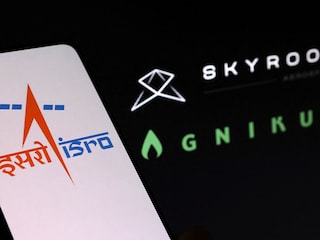Tech5: Indian space startups to get Rs1,000 crore from Government of India; Bioc...
Forbes India's daily tech news bulletin with five headlines that caught our attention


Following the liberalisation of the sector four years ago, India now has more than 200 space tech startup, the minister said in the statement. The government also has the provision for 100 percent foreign direct investment in the sector, it added.
The tests were carried out against high speed targets, demonstrating very critical parameters of maximum range and maximum altitude interception. These development trials showcased repeatability of hit-to-kill capability of the weapon system in various target engagement scenarios covering approaching, receding and crossing modes, according to the release.
The money will give Biocon Biologics a bit more elbow room to pursue its biosimilars strategy. BofA Securities, Citigroup, HSBC, Standard Chartered Bank, BNP PARIBAS and Mizuho ran the fundraising process for the company, which was Biocon Group’s first dollar-based bond issue, according to the press release.
Infosys’s marketers surveyed 399 respondents from banks in the company’s biggest markets, including the US, UK, Germany, France, Australia, New Zealand and the Nordic countries. This cohort was part of a larger group of 2,500 respondents from different industries in these markets.
Based on the banking industry respondents, for the year 2023, Infosys found that on the one hand, banks plan on spending more on cloud computing, while on the other, they didn’t exhaust nearly half (49 percent) of their existing commitments to invest in the cloud model.
Apple has two own stores in India, one in Delhi and the other in Mumbai. Concurrently, Apple has begun manufacturing the iPhone 16 lineup, including the Pro models, locally, as it looks to increase manufacturing capacity in India to reduce dependence on China. However, TechCrunch cites a note from JP Morgan analysts, according to which production in India remains slower than anticipated.
Current output was at 10 to 15 percent of total iPhone production, and the analysts project that to increase to 20 to 25 percent by 2027, two years later than originally planned, according to TechCrunch.
First Published: Oct 07, 2024, 12:45
Subscribe Now